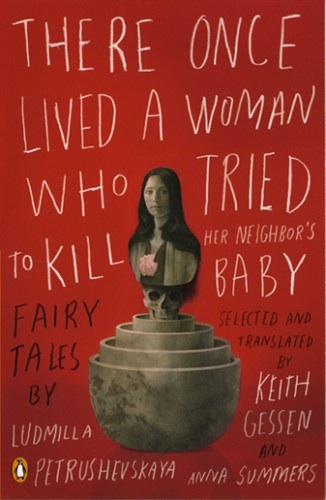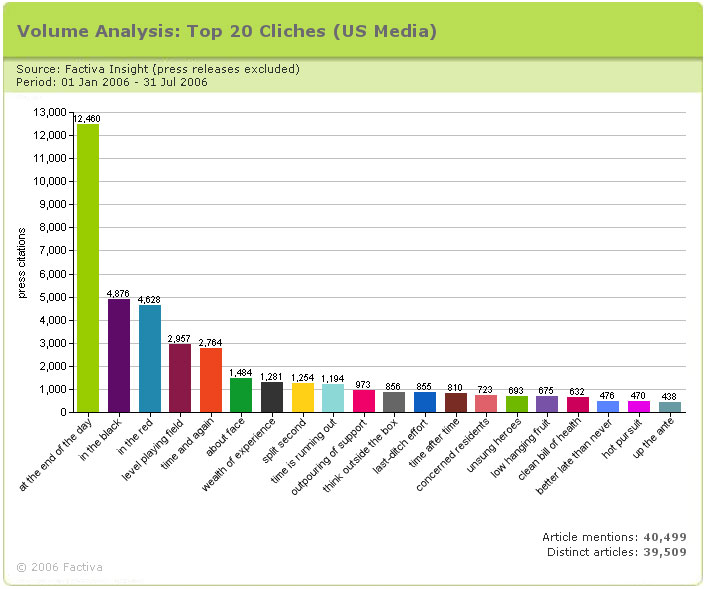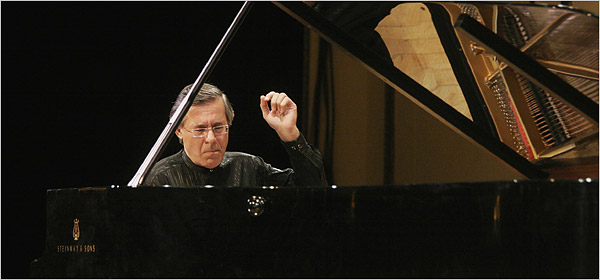Ludmilla Petrushevskaya’s Scary Fairy Tales
 There Once Lived a Woman Who Tried to Kill Her Neighbor’s Baby by Ludmilla Petrushevskaya, translated from the Russian by Keith Gessen and Anna Summers. pp. 206, $15 list ($10.50 at the above-linked Powells page)
There Once Lived a Woman Who Tried to Kill Her Neighbor’s Baby by Ludmilla Petrushevskaya, translated from the Russian by Keith Gessen and Anna Summers. pp. 206, $15 list ($10.50 at the above-linked Powells page)
.
YOU THINK YOU HAVE IT HARD
by Eva Talmadge
.
Sometimes I steal books from Justin. It happens. Last week I swiped a good one: Ludmilla Petrushevskaya’s There Once Lived a Woman Who Tried to Kill Her Neighbor’s Baby, selected and translated by Keith Gessen and Anna Summers. If Justin ever catches on and tries to steal his book back, I’ll go out and buy it, and then read it all again—because this funny, strange, and gruesome short collection is well worth paying full retail ($15) for.
But I don’t want to write one of those reviews that reads like a press release or a protracted blurb. Petrushevskaya is a master storyteller, and like all good fairy tales, hers end in tears. You already know that. Just look at the cover. And it’s easy to say Petrushevskaya is the “heir to the spellbinding tradition of Gogol and Poe”—it says so right there on the back of the book. So okay. Any decent batch of gothic and supernatural short stories is going to get a Poe comp, and Americans will give just about any fiction translated from Russian a Gogol mention. Those are two writers whose names sell books, and pretty much no-brainers here, but (here’s where it gets blurby) damned if Petrushevskaya doesn’t live up to those comparisons and then some, matching both in inventiveness and in gore—and perhaps beating them in heart.
April 20th, 2010 / 10:34 am
Noah Cicero on Why Writers Write
[Noah Cicero sent this to me last week. And yes, it is another (slight) commentary on a review of Shoplifting from American Apparel. It’s more than that, too. If you’re unfamiliar with Noah Cicero’s writing, you can visit his blog, or check out his latest book The Insurgent. -Gene]
In one of the reviews of Tao Lin’s Shoplifting from American Apparel Huw Nesbitt makes the statement, “Real art seeks to examine the truth as it is; not through relativism, atomism, or universalism, but by seeking that which once was or irrevocably, true.” If you have read analytic philosophy your first thought after reading those lines will probably be, “Those sentences don’t make any sense.” The proposition, “the truth as it is,” is actually relativism and universal in its meaning. How can something be true but not universal is a contradiction. READ MORE >
Your Own. Personal. Cliché.
[Elisa Gabbert is back, to holler about review language, usage, and etc! — BB]

On the Guardian’s Books Blog, Peter Robins asks commenters to confess their “personal clichés“: “Everyone has words and phrases they just can’t stop using … Not all clichés are universal.” One “TobyL” says he overuses “quietly tumultuous.” I’m simultaneously grossed out and impressed by anyone who’d admit that.
The personal cliché is evidently closely related to the concept of moves but I emphatically do not think moves are equivalent to clichés. A move may be used only once or be endlessly variable without becoming tired. Clichés, obvs, are used over and over until they lose all interest and power. A move can become a cliché or a tic, which is why it’s good to be aware of your own moves, lest they become your personal clichés. (Just as talking about moves and clichés has become my personal blogging cliché.) (Also please note that the title of this post is a total cliché in posts referring to the Guardian piece; it also appears in the original piece itself. Clichépalooza.)
Relatedly: I keep seeing links to this list of book review “clichés” but they’re mostly single words (“gripping,” “nuanced”). Aren’t these just overused words? I think I need more context to allow the use of cliché, e.g. calling a thriller “gripping” in a review is cliché. The word “gripping” is not a cliché in and of itself. (I am probably focusing too much on the etymology of the word, yes.)
I did a word cloud of my manuscript once and the most frequently used “word” was “blogpoem.” I don’t think that counts. On the other hand, there may be some words for which two usages is too many. The word “supersaturated” appears twice in The French Exit. Can I even use that once, really? I’ve got a handful of deaths. My go-to image for a while was clouds. Fucking loved clouds. But I’m not sure “cloud” is the kind of word you can overuse (I mean, within reason) and I’m not sure they’re a poetry cliché (yet) (as commenters on my last post said of the moon) and I’m not sure they’re even a personal cliché because I’ve been done with clouds for a while. Clouds, meet shitlist. And everybody’s got a body part they overuse and abuse, right? I just control-F’ed a whole lot of eyes.
What are your personal clichés and overused words? Think you don’t have any? Go read your book again and find out.
James Franco edited by the Tyrant

[The Tyrant Giancarlo Ditrapano sent us this and we couldn’t help ourselves. With all due respect to the Esquire fiction camp and the creator. Read both, see what you think? – BB]
I just read the James Franco story in Esquire and thought it was great. There were just a couple of things that needed tweaking in my opinion so I started messing with it. You’ve written a good, funny story, Mr. Franco. But now it’s even better. Remember, it never matters who writes it, it only matters that it gets written. Or something like that. Some good stuff in here though. I’d love to work on something with you for my meager little journal. Email me at ditrapano@nytyrant.com. Let’s talk it out.
N.B. This was done with entirely good intention and I meant no harm, as I never have meant harm. Just having some fun and don’t want anyone to get in trouble or angry over this. Who knows? I may have ruined the thing.
yours truly,
Gian

I. Fontana on Publicity

[This is a comment–regarding some recent posts here–that I. Fontana posted and also sent out to me & Ken, and we thought it was worth presenting on the main page for those who missed it. I. Fontana knows whereof he speaks, and he’s one of my favorite “new” writers out there. Love his short stories, which I’ve linked on HTMLGIANT before, and I know he’s got some other stuff in the works that I’m very, very excited to see published. –N.A.
Nick says it: I. Fontana says it. Presented with no further ado: –K.B.]
Superagent Nat Sobel said in an interview last summer that he chooses at most one in 500 unsolicited manuscripts to represent in a given year. Grove/Atlantic, HarperCollins etcetera — all the major New York publishing houses, in other words — explicitly announce that they will not read any manuscript which does not come from an established agent.
In the early 19th century, literature (and in particular the novel) evolved into a popular art form generally serialized each week in newspapers, which meant that in order to keep the particular novel being read, there had to be narrative pull, even cliffhangers — in general, plot. But this meant that the socalled “unwashed masses” now were exposed to such writing, so that writers no longer had to hang around court or otherwise suck up to aristocrats, publishing their books by subscriptions to the wealthy (which constriction obviously required that the wealthy find such books pleasing). Democracy means including the lowest common denominator as well as the connoisseur.
No One Would Ever Say That
[Much thanks this morning to Elisa Gabbert, who sends thoughts on plainspokenness. – BB]

Over at the new Ploughshares blog (I wrote for it back when it was a humble blogspot), Peter B. Hyland is talking about accessibility and the closely related (in poetry at least) matter of “plainspokenness,” as “plainspoken” poets (such as Billy Collins, he offers) are less intimidating and considered “more convivial.”
It’s a familiar idea that poetry should sound like speech. But Hyland doesn’t claim this; instead, he suggests that “maybe there’s no such thing as plainspoken poetry,” using “The Red Wheelbarrow” as an example of a seemingly plainspoken poem that doesn’t really sound like how people talk.
This reminded me of a post I read years ago (in 2007) on Jonathan Mayhew’s blog:
I learned something quite significant from this. I learned that C Dale Young and I do not speak the same language, poetically speaking. I searched through a recent poetic sequence of mine, The Thelonious Monk Fake Book, to see whether I use words like dark, sadness, chest, hands, water, rain, body, silence. Generally, I don’t use these words very much if at all. Where my vocabulary coincided the most with his was in an Ira Gershwin lyric I happened to be quoting at one point. “Holding hands at midnight , ‘neath the moonlit sky.” I did use “blue” a lot, but that was quoting the titles of Monk tunes, mostly.
It’s no criticism of C Dale’s excellent book of poetry of course to say that I simply couldn’t bring myself use words like that (very much). To me they are *poetry words.* In other words they might correspond to what the average person expects to find in a poem. I don’t like depending on an identifiably poetic tone. On the other hand I’m sure my own *poetry words* would be just as embarrassing, if I knew what they were… If I did know I’m sure I would be obliged to ban them, viewing them as crutches that I was better off without…
Don’t Bitterness! Be Happy–You Sellout! Now with Banjo, Accordion, Wallet Chain, & Jack Spicer
[Jeremy Schmall, by way of reply/addendum/rejoinder to Jim Behrle’s essay about how to become a famous poet overnight that Ken linked yesterday, sent me the following – JT]
(1) To ease the bitter bitter cynicism: httpv://www.youtube.com/watch?v=SEMGe9JkRqU
(2) This power quote from Jack Spicer seems especially resonant now:
“But the point is that most people will exploit poets. They’ll exploit the older ones for the knowledge they have, and they’ll exploit the younger ones for the promise they have, which somehow or other gives the people some kind of thing that maybe they have promise too, which they don’t.
“Essentially, what I mean is, stay loose. Stay absolutely loose, and don’t accept any offers whatsoever.
“But you’re not just a poet. You’re also a human being who wants to be recognized and everything else. One of the best things that I heard on that was last night on KCBS where some guy–his name was Anderson–was talking about peach farmers, and he said the peach farmers didn’t know a good goddamn thing about the number of peaches that were needed in the market. In other words, they would send in peaches, and peaches would go down to one cent a peach, or whatever it was, and that this had a great deal to do with farm labor.
“What I’m saying is that you’re going to sell out eventually. You have to, just for economic reasons. But when you sell out, know exactly what your peaches cost. Know exactly how many peaches there are on the market. Know exactly what is the price you can sell out for.”
– from Lecture 4, “Poetry and Politics,” July 14th, 1965 (page 154)
Did You Just Tell Me To Shut Up? – A Guest Post from Giancarlo Ditrapano
[The Tyrant sends his thoughts on the unpspeakable. Please enjoy. – BB]
“Most stuff that is genuine is better left unsaid.” This is from a letter written in 1993 by J.D. Salinger to his friend E. Michael Miller (for this story, go here). Sounds like old boy’s last plea, doesn’t it? That last line of the red one, you know: “Don’t tell anybody anything. If you do, you start missing everybody.” This thought occupies my mind past the point of it being healthy. There are so many things for me that I cannot write down, or will not write down. I have tried to write them down, and I have written them down, and hated myself afterwards for doing it.
It’s the same with speech. There are so many things I can’t speak about, won’t speak about. I have tried to speak about them, and I have spoken about them, and hated myself afterwards for doing it. I don’t know how to categorize these untouchables for there is no common denominator that I can pin down. I am not talking about gossip or secrets. Forget all that shit. I’m talking about the times or thoughts or experiences that cannot be regaled, or feel like they shouldn’t be regaled (even though they could be regaled but you would just feel like shit afterwards because no matter how good it felt to tell it, once you’re done it always feels like you have just let go of a kite string). That bit of advice from Dorothy Parker (about how if you have an idea for a story, not to speak about it or it will lose its steam) has something to do with it, but not exactly. Or it’s like that feeling you feel in that span of time between the moment you hear some good news (Writers, insert “acceptance-letter joy” here) and the moment that you start blabbing your head off about it. As soon as you start communicating it, telling others about it, something disappears, doesn’t it? And there was something good about that something that disappeared, wasn’t there? It’s not exactly like, but is kind of like, how you and your good friend would never talk about how good of friends you are because the mere mention of you even being friends would cause your friendship to wither somehow.
GHOST RIDERS IN THE SKY: SARA WINTZ ON LIZ WALDNER’S “PLAY”
 Sandwiched somewhere in between the recently published Kenning Anthology of Poets Theater, and the amazing trajectory of Ugly Duckling Press Publications, newcomers Lightful Press released their first book late last year: Play, by Liz Waldner.
Sandwiched somewhere in between the recently published Kenning Anthology of Poets Theater, and the amazing trajectory of Ugly Duckling Press Publications, newcomers Lightful Press released their first book late last year: Play, by Liz Waldner.
Play details a sequence of otherworldly occurrences in a land of language play. And it does so in a very theatrical format. From its letterpress cover to the dialogue among its lines, Play contains a multitude of language tableaus that encourage readers to experience poetic form in a tactile and performance-oriented way.
Waldner suggests performance, by bending her poetic text closer to graphic score, through typographic designs, closer to script, via dialogue, and closer to dance through rhyme and repetition, and overt stage directions, like: “I say, don’t I know you from somewhere?/Who are you?/(song&dance ensue)“.
February 13th, 2010 / 2:20 pm
How the Tablet has Turned: A guest-post by Elliott David

According to this NYT piece yesterday, the book publishing industry, who have been ever so patient for a savior (likely because one isn’t remotely foreseeable) has finally arrived at the astrological alignment under which they can ceremonially raise the ghosts of Alfred A Knopf Sr., Roger Williams Straus, Jr., Allen Lane, and George Plimpton, who will then enter the machine and destroy the internet from within.

